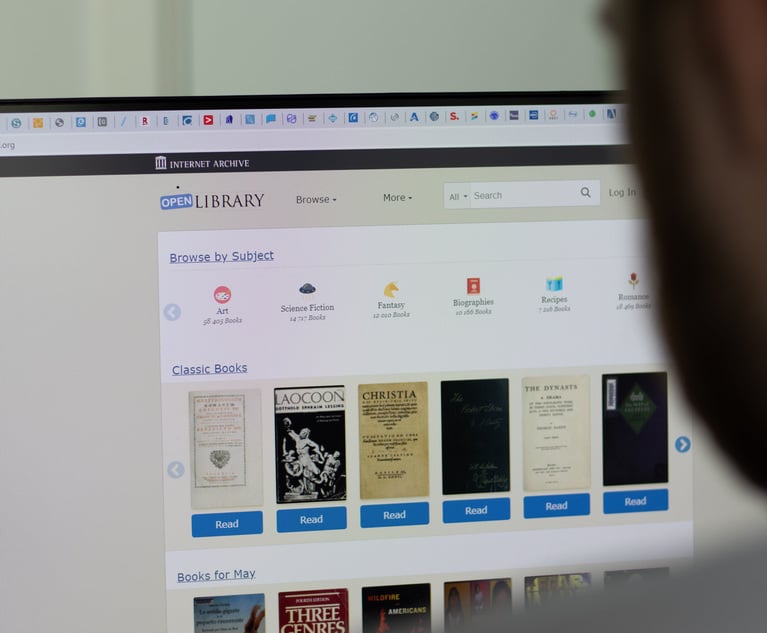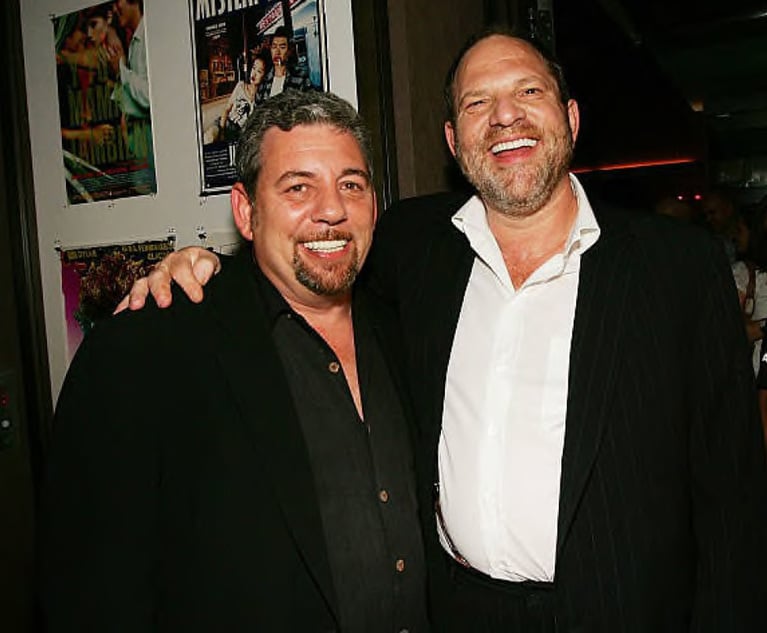Understanding the Book or Screenplay Option Agreement
Wallace Collins writes: An option agreement at its most basic is a contract whereby the writer grants to a producer, production company or studio, for a period of time and for a payment, the right to make a film of the writer's book, story or screenplay. The three main material issues that usually arise in negotiating such a deal are the length of the option period, the amount of the option payment and the purchase price if the project comes to fruition. How each of these issues will be resolved will vary depending on the negotiating leverage of the respective parties.
July 05, 2017 at 02:01 PM
8 minute read
Many writers dream that someday their story or script will garner interest from someone who wants to develop it into a film or TV project. Usually, the first step is where that someone, maybe a producer or a production company or even a studio, offers the writer a contract known as an option agreement. As with all such matters where art meets commerce, every writer should have a literary agent and an informed lawyer advising them about their business dealings once they get to this stage of the process, where the creative spills over into the business world.
An option agreement at its most basic is a contract whereby the writer grants to a producer, production company or studio, for a period of time and for a payment, the right to make a film of the writer's book, story or screenplay. The three main material issues that usually arise in negotiating such a deal are the length of the option period, the amount of the option payment and the purchase price if the project comes to fruition. How each of these issues will be resolved will vary depending on the negotiating leverage of the respective parties (i.e., whether the writer is a beginner or has had prior success in the industry and whether the producer is an experienced player or just a fledgling production company trying to get traction).
Period of Time
An option agreement will designate an “option period” or length of time granted to a producer or studio to commence production of the project. It can range from six months to two years or longer, depending on the negotiations. Such agreements frequently include additional periods of time for the producer to extend the length of the agreement in consideration of additional payments to the writer.
Option Payment
The option agreement will also set forth an “option payment,” which is the amount to be paid to the writer as consideration for allowing the producer the privilege of utilizing the writer's story for development purposes. Again, depending on the negotiating strength of each side, this could range from a very small amount (e.g., a few hundred dollars or even one dollar) to a larger payment (tens of thousands of dollars). Then, if the other party wants to extend the option period for an additional length of time after the initial term, provision would be made for additional payments to the writer. In most cases, this additional payment will be negotiated to be more substantial even if the first payment is small.
The amount of the option payments will vary depending on the negotiation process and other factors such as the writer's track record in the industry and the potential budget of the film or TV project. Some industry insiders have said that as a rule of thumb, option payments are frequently equivalent to 10 percent of the purchase price, but these amounts are always negotiable and lawyers need to advise their client's to be careful and not allow themselves to be taken advantage of in the rush of excitement that surrounds interest in their story.
Purchase Price
Another material term in an option agreement is the “purchase price,” which is the amount of money that the writer will receive in the event the screenplay is made into a feature film or TV project. The purchase price is often calculated on a sliding scale as a percentage of the budget. In other words, as the budget of the film grows, so will the purchase price, although as with all negotiated terms this too can vary greatly.
Conclusion
When properly negotiated, an option agreement can be a win-win situation for both the writer and the producer. The writer is paid to lease his or her book, story or screenplay for a limited period of time, while the producer attempts to get the project “green-lighted” by a studio or production company. If this happens, the writer will receive a nice purchase price for his work. If it does not happen during the option period, then the writer keeps the option payment or payments paid to date and all rights to the story revert back to the writer. The writer could then decide to option the script again to another producer.
This content has been archived. It is available through our partners, LexisNexis® and Bloomberg Law.
To view this content, please continue to their sites.
Not a Lexis Subscriber?
Subscribe Now
Not a Bloomberg Law Subscriber?
Subscribe Now
NOT FOR REPRINT
© 2024 ALM Global, LLC, All Rights Reserved. Request academic re-use from www.copyright.com. All other uses, submit a request to [email protected]. For more information visit Asset & Logo Licensing.
You Might Like
View All

Sports Attorney Rejoins Jets for Second Tour of Duty as GC

Judge Dismisses Sexual Assault Lawsuit Against Knicks Owner, Harvey Weinstein

White Stripes File Copyright Suit Against Trump for Campaign's Use of Music
4 minute readTrending Stories
- 1Call for Nominations: Elite Trial Lawyers 2025
- 2Senate Judiciary Dems Release Report on Supreme Court Ethics
- 3Senate Confirms Last 2 of Biden's California Judicial Nominees
- 4Morrison & Foerster Doles Out Year-End and Special Bonuses, Raises Base Compensation for Associates
- 5Tom Girardi to Surrender to Federal Authorities on Jan. 7
Who Got The Work
Michael G. Bongiorno, Andrew Scott Dulberg and Elizabeth E. Driscoll from Wilmer Cutler Pickering Hale and Dorr have stepped in to represent Symbotic Inc., an A.I.-enabled technology platform that focuses on increasing supply chain efficiency, and other defendants in a pending shareholder derivative lawsuit. The case, filed Oct. 2 in Massachusetts District Court by the Brown Law Firm on behalf of Stephen Austen, accuses certain officers and directors of misleading investors in regard to Symbotic's potential for margin growth by failing to disclose that the company was not equipped to timely deploy its systems or manage expenses through project delays. The case, assigned to U.S. District Judge Nathaniel M. Gorton, is 1:24-cv-12522, Austen v. Cohen et al.
Who Got The Work
Edmund Polubinski and Marie Killmond of Davis Polk & Wardwell have entered appearances for data platform software development company MongoDB and other defendants in a pending shareholder derivative lawsuit. The action, filed Oct. 7 in New York Southern District Court by the Brown Law Firm, accuses the company's directors and/or officers of falsely expressing confidence in the company’s restructuring of its sales incentive plan and downplaying the severity of decreases in its upfront commitments. The case is 1:24-cv-07594, Roy v. Ittycheria et al.
Who Got The Work
Amy O. Bruchs and Kurt F. Ellison of Michael Best & Friedrich have entered appearances for Epic Systems Corp. in a pending employment discrimination lawsuit. The suit was filed Sept. 7 in Wisconsin Western District Court by Levine Eisberner LLC and Siri & Glimstad on behalf of a project manager who claims that he was wrongfully terminated after applying for a religious exemption to the defendant's COVID-19 vaccine mandate. The case, assigned to U.S. Magistrate Judge Anita Marie Boor, is 3:24-cv-00630, Secker, Nathan v. Epic Systems Corporation.
Who Got The Work
David X. Sullivan, Thomas J. Finn and Gregory A. Hall from McCarter & English have entered appearances for Sunrun Installation Services in a pending civil rights lawsuit. The complaint was filed Sept. 4 in Connecticut District Court by attorney Robert M. Berke on behalf of former employee George Edward Steins, who was arrested and charged with employing an unregistered home improvement salesperson. The complaint alleges that had Sunrun informed the Connecticut Department of Consumer Protection that the plaintiff's employment had ended in 2017 and that he no longer held Sunrun's home improvement contractor license, he would not have been hit with charges, which were dismissed in May 2024. The case, assigned to U.S. District Judge Jeffrey A. Meyer, is 3:24-cv-01423, Steins v. Sunrun, Inc. et al.
Who Got The Work
Greenberg Traurig shareholder Joshua L. Raskin has entered an appearance for boohoo.com UK Ltd. in a pending patent infringement lawsuit. The suit, filed Sept. 3 in Texas Eastern District Court by Rozier Hardt McDonough on behalf of Alto Dynamics, asserts five patents related to an online shopping platform. The case, assigned to U.S. District Judge Rodney Gilstrap, is 2:24-cv-00719, Alto Dynamics, LLC v. boohoo.com UK Limited.
Featured Firms
Law Offices of Gary Martin Hays & Associates, P.C.
(470) 294-1674
Law Offices of Mark E. Salomone
(857) 444-6468
Smith & Hassler
(713) 739-1250






